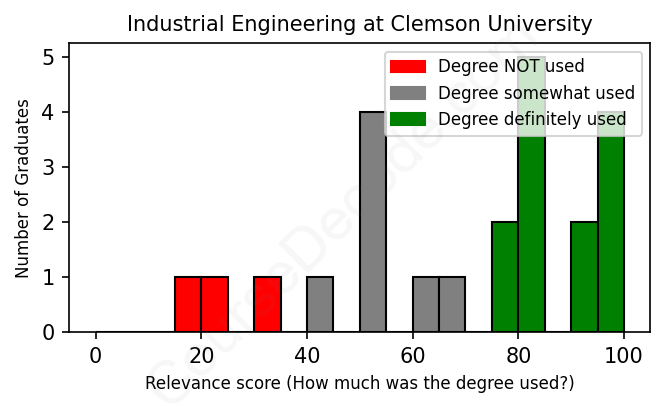
First, some facts. Of the Industrial Engineering graduates from Clemson University we've analyzed , here's how many have used (or NOT used) their degree in their career:

These are estimates based on AI analysis of 23 LinkedIn profiles (see below).
The verdict? Slightly above average. Overall, with an average relevance score of 69%, Industrial Engineering graduates from Clemson University have a slightly higher likelihood (+2%) of finding work in this field compared to the average graduate across all fields:
And for comparison, here's the chart for all profiles we've looked at across all degrees.
Also, after graduating, only 26% of these graduates have pursued further education other than another Bachelor's degree (such as a Masters degree or other), compared to the average across all profiles of 35%. This suggests a Bachelors degree is enough for most Industrial Engineering graduates, and it's normal to look for work straight after graduation.
See the details:
|
Relevance score: 65% We think this person has gone into a career only somewhat relevant to their degree. We think this person has gone into a career only somewhat relevant to their degree.
DEGREE INFOGraduated in 2012 from Clemson University with a Bachelors of Science in Industrial Engineering. No other secondary education since. JOB HISTORY SINCE GRADUATIONEngineering Project Manager Walmart Jun 2012 - May 2015 Staff Continuous Improvement Professional  Crayola May 2015 - Apr 2018 Director of Business Development  Sunland Logistics Solutions Apr 2018 - Oct 2023 Director of SC Logistics  South Carolina Council on Competitiveness Oct 2023 - Present ABOUTSupply Chain & Logistics Professional. Passionate about helping create a more competitive economy across South Carolina. |
The top 10 most common jobs done by the graduates we've analyzed (ranked most common to least) are:
When looking at the job paths of Clemson University graduates with a degree in Industrial Engineering, you'll notice that some specific patterns emerge. A considerable number of graduates find themselves in positions like Process Improvement Engineers, Continuous Improvement Specialists, and various engineering roles at companies such as General Dynamics and The Home Depot. These jobs heavily lean on the skills acquired during their studies, focusing on optimizing processes, managing projects, and applying industrial engineering principles directly in their daily tasks. So, there’s a solid chunk of graduates who are really using what they learned in school in their jobs.
However, the relevance of these jobs to their degree isn't universally high. While many roles like Process Engineers and Continuous Improvement Professionals are a perfect match for industrial engineering skills, others, like the various merchandising and customer service positions some graduates have taken, are way off the mark. Many graduates shift into roles that don't directly match their academic training, such as project or content management roles that focus more on business development rather than the technical aspects of industrial engineering. So, while a lot of these grads start off strong with relevant positions, some end up a bit scattered across fields that don't fully utilize their engineering background. It's a mixed bag, but it definitely shows the versatility of the degree!
Here is a visual representation of the most common words in job titles for Industrial Engineering graduates (this is across all Industrial Engineering graduates we've analyzed, not just those who went to Clemson University):

When looking at the career trajectories of Industrial Engineering graduates from Clemson University, it's clear that many have found their way into roles that are quite relevant to their degree. Most of these graduates tend to kick off their careers in engineering positions, often taking on roles like Process Improvement Engineer, Manufacturing Engineer, or various engineering analyst positions shortly after graduation. For example, graduates from 2010 and 2011 started as engineers at major firms like Milliken & Company and General Dynamics Electric Boat, paving the way for more advanced roles in their organizations over the years. This early focus on engineering roles typically sets a strong foundation for career growth in the field.
Fast forward five to ten years, and we see many of these graduates moving into leadership or specialized roles. They often climb the ladder to positions such as Engineering Supervisor, Continuous Improvement Manager, or even Director roles within large companies. For instance, a graduate from 2012 transitioned from Engineering Project Manager at Walmart to a Director of Business Development, highlighting how graduates can leverage their skills and experiences to branch out into diverse areas. While there are a few who have taken a more winding path with less directly related positions—like a life coach or customer service roles—overall, many Clemson Industrial Engineering grads have successfully forged careers that are not only stable but also allow for significant growth and responsibility within the field.
So, a Bachelor’s degree in Industrial Engineering, whether at Clemson or elsewhere, can be pretty challenging—definitely more demanding than some other majors, but not the worst out there. You'll be diving into a mix of math, science, and engineering principles, with courses in systems optimization, operations research, and maybe even a bit of programming. If you enjoy problem-solving and are good with numbers, you’ll probably find it manageable, but be prepared for some late nights studying and working on projects. Overall, it's a solid balance; it requires effort, but if you stay on top of your work and don’t procrastinate too much, you can definitely handle it!
Most commonly, in the LinkedIn profiles we've looked at, it takes people 5 years to finish a Bachelor degree in Industrial Engineering.
Looking at the career paths of these Clemson University Industrial Engineering grads, it seems like most of them are doing pretty well financially. Many have climbed the ladder quickly, landing roles like Merchant at Home Depot, Senior Engineer at General Dynamics, and even Directors at various companies pretty soon after graduation. Their job titles suggest they're in good positions, often tied to decent salaries in industries that are known for paying well, especially in tech and engineering fields. Sure, some took a bit longer to find their footing or had internships, but given the number of people moving into high-responsibility roles rather quickly, I'd say it's safe to assume they're making decent money overall.
Here is a visual representation of the most common words seen in the "about" section of LinkedIn profiles who have a Bachelor degree in Industrial Engineering (this is across all Industrial Engineering graduates we've analyzed, not just those who went to Clemson University). This may or may not be useful:

Here are all colleges offering a Bachelor degree in Industrial Engineering (ordered by the average relevance score of their Industrial Engineering graduates, best to worst) where we have analyzed at least 10 of their graduates:
| College | Score | Count |
|---|---|---|
 Iowa State University Iowa State University
|
88 | 11 |
 North Carolina State University North Carolina State University
|
87 | 12 |
 California Polytechnic State University-San Luis Obispo California Polytechnic State University-San Luis Obispo
|
87 | 15 |
 Texas A&M University Texas A&M University
|
83 | 39 |
 Purdue University Purdue University
|
81 | 36 |
 University of Central Florida University of Central Florida
|
80 | 23 |
 Georgia Institute of Technology Georgia Institute of Technology
|
80 | 59 |
 Penn State University Penn State University
|
79 | 16 |
 Texas Tech University Texas Tech University
|
79 | 10 |
 University of Pittsburgh University of Pittsburgh
|
79 | 15 |
 University of Washington University of Washington
|
78 | 12 |
 University of Arkansas University of Arkansas
|
78 | 11 |
 University of Wisconsin-Madison University of Wisconsin-Madison
|
76 | 13 |
 University of Illinois at Urbana-Champaign University of Illinois at Urbana-Champaign
|
73 | 15 |
 West Virginia University West Virginia University
|
71 | 19 |
 Clemson University Clemson University
|
69 | 23 |
 University of Florida University of Florida
|
64 | 11 |